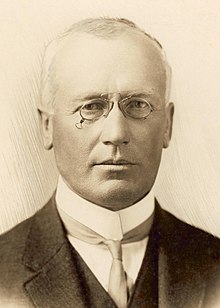
Back ويليام ايرڤين (محامى) ARZ William Irvine (homme politique australien) French William Irvine Polish
Sir William Irvine | |
|---|---|
 | |
| Chief Justice of Victoria | |
| In office 9 April 1918 – 30 September 1935 | |
| Preceded by | John Madden |
| Succeeded by | Frederick Mann |
| Attorney-General of Australia | |
| In office 24 June 1913 – 17 September 1914 | |
| Prime Minister | Joseph Cook |
| Preceded by | Billy Hughes |
| Succeeded by | Billy Hughes |
| Premier of Victoria | |
| In office 10 June 1902 – 16 February 1904 | |
| Governor | George Clarke Reginald Talbot |
| Preceded by | Alexander Peacock |
| Succeeded by | Thomas Bent |
| Member of the Australian Parliament for Division of Flinders | |
| In office 12 December 1906 – 5 April 1918 | |
| Preceded by | James Gibb |
| Succeeded by | Stanley Bruce |
| Personal details | |
| Born | 6 July 1858 Newry, County Down, Ireland |
| Died | 20 August 1943 (aged 85) Toorak, Victoria, Australia |
| Political party | Liberal (federal) |
| Spouse |
Agnes Wanliss (m. 1891) |
| Relations | John Mitchel (uncle) |
| Alma mater | Trinity College, Dublin University of Melbourne. |
| Profession | Barrister |
Sir William Hill Irvine GCMG (6 July 1858 – 20 August 1943) was an Australian politician and judge. He served as Premier of Victoria (1902–1904), Attorney-General of Australia (1913–1914), and Chief Justice of Victoria (1918–1935).
Irvine was born in County Down, Ireland. He was educated at Trinity College, Dublin, and the University of Melbourne, immigrating to Australia in 1879. He qualified as a barrister and was first elected to the Victorian Legislative Assembly in 1894. Appointed attorney-general of Victoria in 1899, Irvine succeeded Alexander Peacock as premier in 1902 with the backing of the National Citizens' Reform League and retained office after the 1902 state election. He carried out democratic reforms but attracted the enmity of the labour movement for his suppression of a railway strike in 1903, resigning as premier in 1904.
At the 1906 federal election, Irvine was elected to the seat of Flinders. He served as attorney-general in the Liberal government of Joseph Cook from 1913 to 1914, and during World War I was an advocate of conscription and leading campaigner in the 1916 referendum on overseas conscription. Irvine resigned from federal parliament in 1918 to become chief justice of Victoria. He served on the court until 1935 and as lieutenant-governor also served as acting governor of Victoria for nearly three years during the Great Depression.